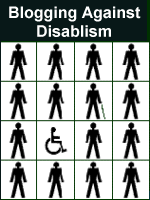 Coming in a bit late for our fifth straight appearance in the Blogging Against Disablism Day swarm. Sunny Saturdays and blogging don't go together in my universe! And this will be briefer than our past entries, too. (Past BADD entries: 2009, 2008, 2007, 2006) Go to Goldfish's complete compendium of links to BADD posts for some much meatier fare.
Coming in a bit late for our fifth straight appearance in the Blogging Against Disablism Day swarm. Sunny Saturdays and blogging don't go together in my universe! And this will be briefer than our past entries, too. (Past BADD entries: 2009, 2008, 2007, 2006) Go to Goldfish's complete compendium of links to BADD posts for some much meatier fare."If this activation resulted in a living haploid, what would it be like? Probably small, female, infertile. The brain? The body? What right had I to create this entity? I knew it could never be normal, but could it be happy? Could it love? Could it be loved? By me? No doubt the thing could be stopped... somehow.... 'No,' I said, 'I shall let it develop. It will be interesting.'"
--the newly-expecting Mary, narrating character in Naomi Mitchison's Memoirs of a Spacewoman (1962).
For mid-20c. science fiction, Memoirs of a Spacewoman seems to have a refreshing lack of disablism, an unusual openness to disability being an everyday part of the far future. Mary is also that rare mother character that's neither tragic nor hovering nor heroic--Viola (the "haploid") is one of Mary's several children, and when she worries about Viola it's usually for specific reasons, not a generalized "poor baby" attitude. Mary's professional work, studying modes of communicating among non-humanoid life on distant planets, requires her to be especially inclusive in her understanding of differences (across a range much vaster than present-day humans are ever asked to accommodate). And there's some indication that her traveling schedule gives her somewhat flexible expectations about how her kids will grow and change. But one doesn't get the sense that Mitchison means us to see Mary's love and respect for Viola as very unusual for their future world.
I don't read much science fiction these days, but books like this make me think I should go back and re-read some of the short stories from the 1950s and 1960s that I read when I was a kid (in the 1970s and 1980s--I was buying old paperbacks at library sales, thus the lag). What might I have absorbed from those stories, about disability, about normality, about the future and who belongs where? Is the Mitchison novel unusual for its genre and era, or am I presuming too much? Happily, I've discovered that many pre-1963 SF stories are available free, in audio format, from Librivox. So I'm downloading away, grabbing the ones with titles that grab my attention, or the ones with women writers, just to see what I missed or forgot the first time.
"It will be interesting."
PS: While writing this, I found a cite for a recent article about Memoirs of a Spacewoman by a Scottish disability studies scholar; haven't read yet (I intend to, soon), but here it is:
Gavin Miller, "Animals, Empathy, and Care in Naomi Mitchison's Memoirs of a Spacewoman," Science Fiction Studies 35(2)(2008).(guess I should have looked for it first; I'd hold off and post later, but it's Blogging Against Disablism Day today, right?)
Oh, I feel so much better now, erading this, after my own rather sad vitriol. I'm a rather nervous science fiction reader (though having good times with the remarkably enabling texts of Lois McMaster Bujold--I'm not sure if her Miles books typefy an ara, I think they're a 1990s exception more than anything, but they are excellent all the same), but this makes me very keen to read the work.
ReplyDeleteThank you.
Hmmm, at first I felt a little uncomfortable with the scientific objectivity of the statement "It will be interesting." So I've decided to read the book. I'm interested in how sci-fi portrayals differ from other literary treatments of disability.
ReplyDelete